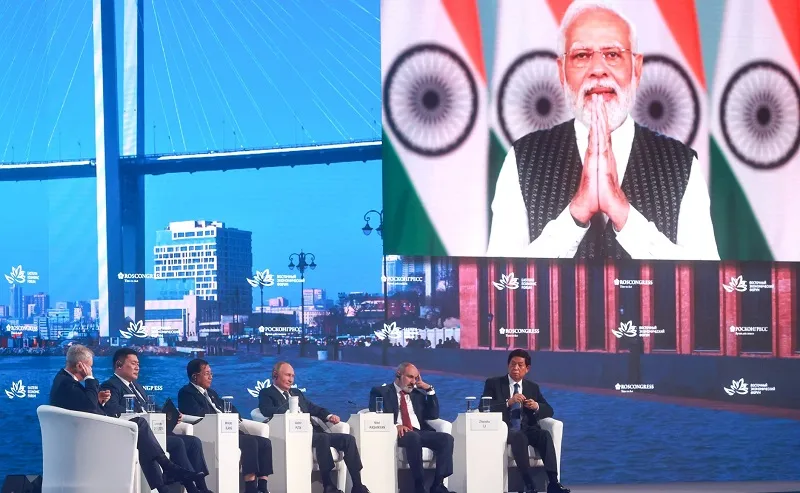Appreciating Russian President Vladimir Putin’s vision for the development of the Russian Far East, Prime Minister Narendra Modi has emphasised that connectivity will play an important role in India’s future contribution to the resource-rich region.
With Putin and several other leaders in attendance at Vladivostok, PM Modi addressed the plenary session of the seventh Eastern Economic Forum (EEF) 2022 – an event which he had attended as the guest of honour in 2019 – virtually on Wednesday.
“Whether we talk about the International North-South Corridor, the Chennai-Vladivostok Maritime Corridor or the Northern Sea Route, connectivity will play an important role in the development of our relations in the future,” PM Modi told the gathering.
Putin, along with Armenian PM Nikol Pashinyan, Mongolia PM Luvsannamsrain Oyun-Erdene, Commander-in-Chief of the Armed Forces of Myanmar Min Aung Hlain, Chairman of the Standing Committee of the National People’s Congress of China Li Zhanshu, Prime Minister of Malaysia Ismail Sabri Yacob (virtually) and Vietnam PM Pham Minh Tinh (virtually), listened intently as PM Modi outlined his vision.
“In 2019, I had the opportunity to participate in this forum. At that time, we announced India’s ‘Act Far-East’ policy. And as a result, India’s cooperation with the Russian Far East has increased in various fields. Today, this policy has become a key pillar of the ‘Special and Privileged Strategic Partnership’ of India and Russia,” said the Indian PM.
Stating that the EEF established in 2015 has become a major global forum for international cooperation in the development of the Russian Far East, PM Modi highlighted that this month marks the 30th anniversary of the establishment of the Consulate of India in Vladivostok, the first by any country in the city.
Since then, he said, Vladivostok has been a witness to many milestones in the India-Russia relationship.
“India is keen to strengthen its partnership with Russia on Arctic issues. There is also immense potential for cooperation in the field of energy. Along with energy, India has also made significant investments in the Russian Far East in the areas of pharma and diamonds,” he said.
As has been reported by IndiaNarrative.com in the past, the 20th India-Russia Bilateral Summit and the 5th Eastern Economic Summit, where PM Modi was the chief guest, paved the way for India’s larger cooperation in the fields of not only oil and gas sectors but also road transport, defence, trade and investments in the Russian Far East.
Listing significant Indian investments in the region, with the Sakhalin’s oil fields being a classic example, PM Modi had said then that together, India and Russia will cross the distances of space and also bring out prosperity from the depths of the sea.
On Wednesday, he insisted that India’s growing participation can act as a game-changer for the development of the region.
“Russia can become an important partner for the Indian steel industry through the supply of coking coal. We can also have good cooperation in the mobility of talent. Indian talent has contributed to the development of many developed regions of the world. I believe that the talent and professionalism of Indians can bring about rapid development in the Russian Far East,” remarked PM Modi.
A much-anticipated trilateral cooperation initiative between longstanding and time-tested partners India, Russia, and Japan was also taking shape in the Russian Far East before the ongoing conflict began in Ukraine.
आज के globalized world में, विश्व के किसी एक हिस्से की घटनाएं पूरे विश्व पर प्रभाव पैदा करती हैं।
यूक्रेन संघर्ष और कोविड महामारी से ग्लोबल सप्लाई चेन्स पर बड़ा असर पड़ा है।
Foodgrain, Fertilizer, और Fuel की कमी विकासशील देशों के लिए बड़ी चिंता के विषय हैं: PM @narendramodi
— PMO India (@PMOIndia) September 7, 2022
During his speech at the forum today, PM Modi said that India’s ancient doctrine of ‘Vasudhaiva Kutumbakam’ teaches to see the world as a family, and thus, in today’s globalized world, events in one part of the world create an impact on the whole world.
He stressed that India supports all peaceful efforts to end the ongoing conflict and also welcomes the recent agreement concerning the safe export of cereals and fertilizers.
“The Ukraine conflict and the Covid pandemic have had a major impact on global supply chains. Shortages of food grains, fertilizers, and fuels are a major concern for developing countries. Since the beginning of the Ukraine conflict, we have stressed the need to take the path of diplomacy and dialogue,” concluded the Prime Minister.
Also Read: India steps up diplomacy to buy oil from the Russian Far East




















